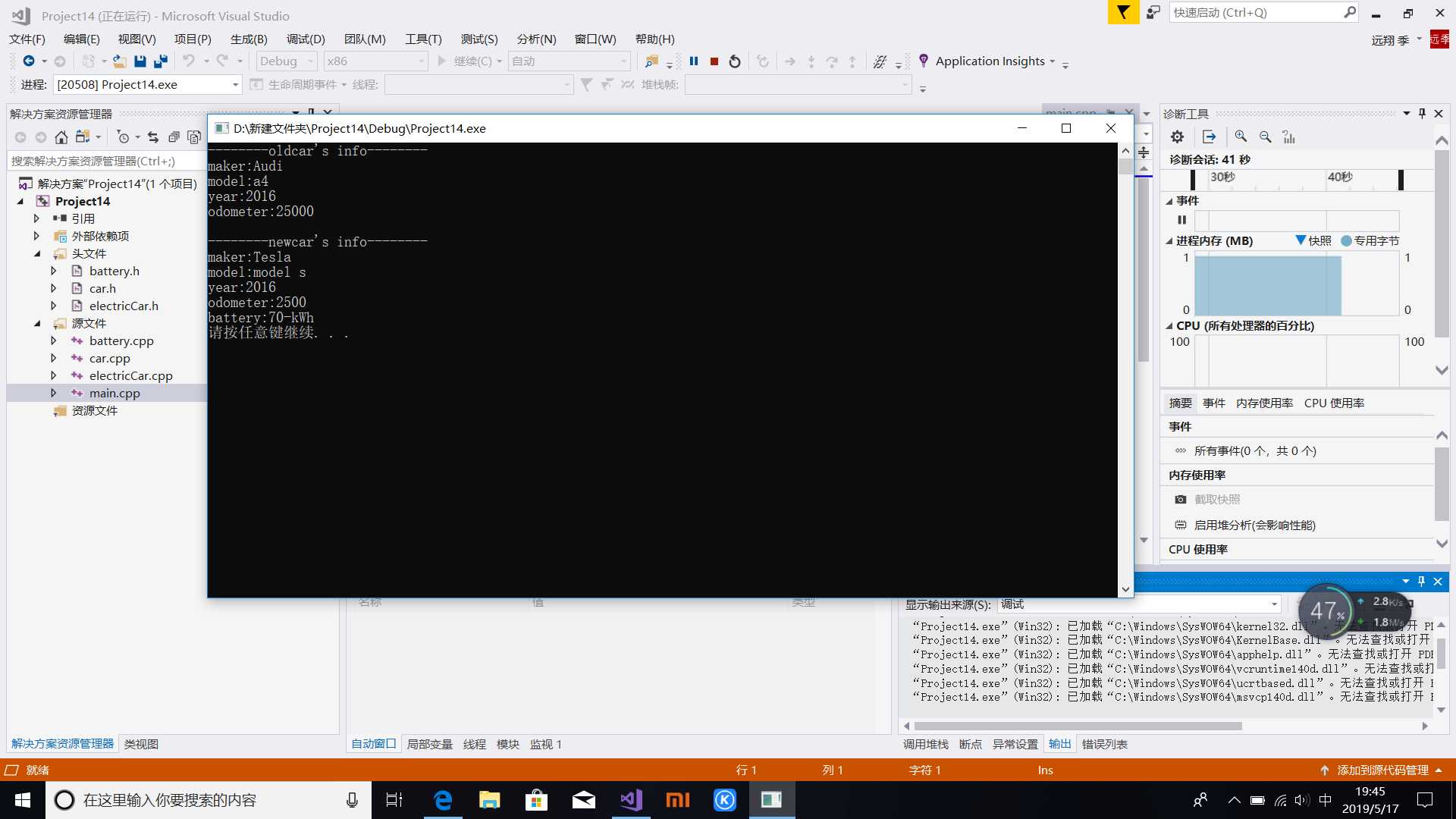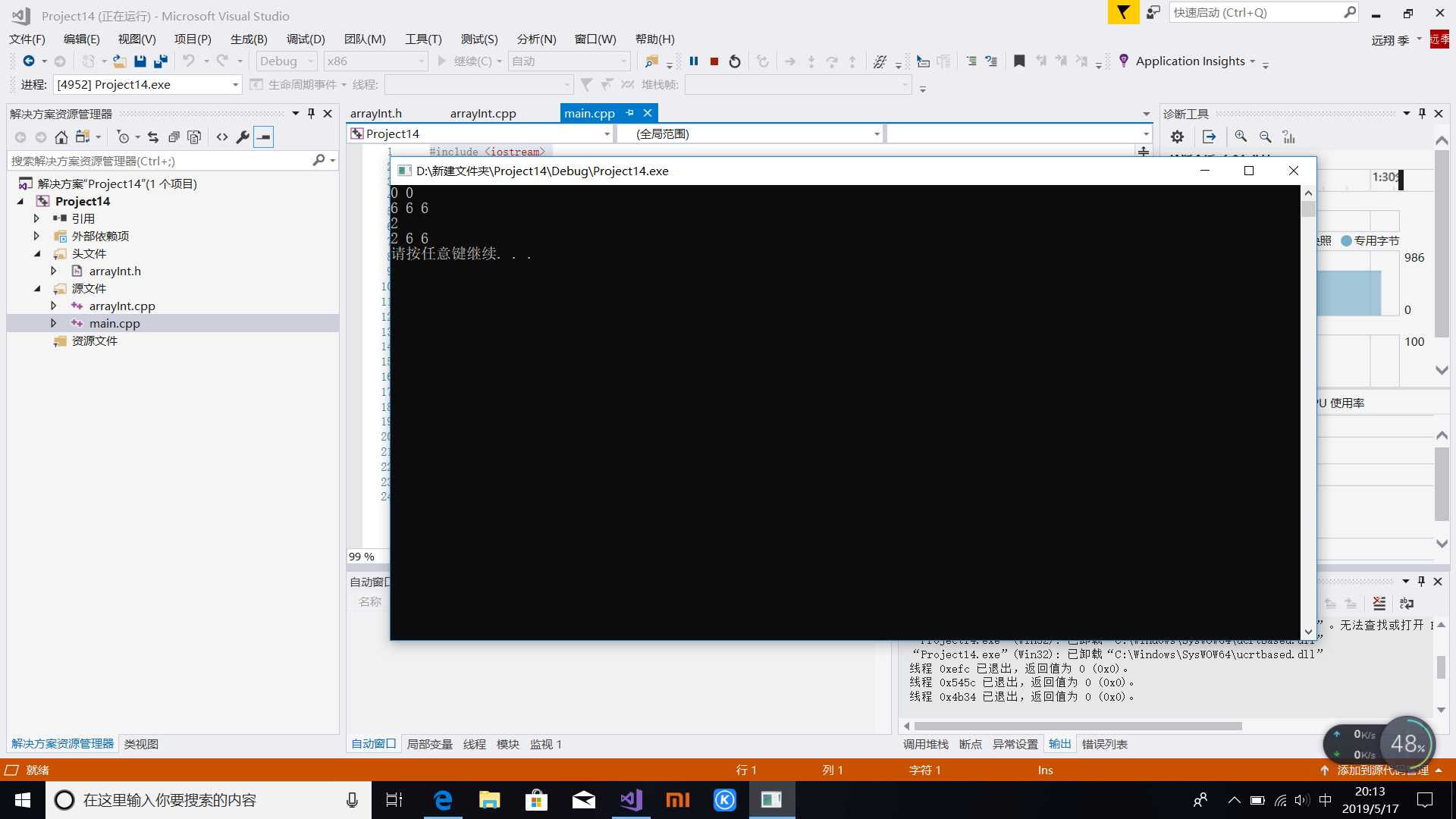实验4
Posted jiyuanxiangzhouziying
tags:
篇首语:本文由小常识网(cha138.com)小编为大家整理,主要介绍了实验4相关的知识,希望对你有一定的参考价值。
1. 车辆基本信息管理 问题场景描述如下: 为了对车量基本信息进行管理,对现实世界车量基本信息抽象后,抽象出Car类、ElectricCar类、Battery类, 它们之间的关系描述如下:基于Car类派生出ElectricCar类,派生类ElectricCar中新增数据成员为Battery类 对象。

#ifndef CAR_H #define CAR_H #include<string> #include<iostream> using namespace std; class Car { public: Car(); Car(string m, string mo, int y, int o=0 ) :maker(m), model(mo), year(y) ,odometer(o){} friend ostream &operator<<(ostream &out,Car &t); string getm(); string getmo(); int gety(); int geto(); void updateOdometer(int m); private: string maker; string model; int year; int odometer; }; #endif

#ifndef BATTERY_H #define BATTERY_H using namespace std; class Battery { public: Battery(); Battery(int s); int getsize(); private: int size; }; #endif

#ifndef ELECTRICCAT_H #define ELECTRICCAR_H #include"car.h" #include"battery.h" #include<string> using namespace std; class ElectricCar:public Car { public: ElectricCar(string a, string b, int c, int d=0); void updateOdometer(int m); friend ostream &operator<<(ostream &out, ElectricCar &q); private: Battery battery; }; #endif

#include"car.h" #include<iostream> using namespace std; ostream &operator<<(ostream &out, Car &t) { out << "maker:" << t.maker << endl << "model:" << t.model << endl << "year:" << t.year << endl << "odometer:" << t.odometer; return out; } Car::Car() { } void Car::updateOdometer(int m) { int &n = m; if (n < odometer) { cout << "Warning,Update is wrong " << endl; } else odometer = n; } string Car::getm() { return maker; } string Car::getmo() { return model; } int Car::gety(){ return year; } int Car::geto() { return odometer; }

#include"battery.h" Battery::Battery() { size=70; } Battery::Battery(int s) { size = s; } int Battery::getsize() { return size; }

#include"electricCar.h" #include"car.h" #include"battery.h" #include<iostream> using namespace std; ElectricCar::ElectricCar(string a, string b, int c, int d):Car(a, b, c, d){ } ostream &operator<<(ostream &out, ElectricCar &q) { out << "maker:" << q.getm() << endl << "model:" << q.getmo() << endl << "year:" << q.gety() << endl << "odometer:" << q.geto()<< endl; out << "battery:" << q.battery.getsize() << "-kWh" ; return out; } void ElectricCar::updateOdometer(int m) { this->Car::updateOdometer(m); }

#include <iostream> using namespace std; #include "car.h" #include "electricCar.h" int main() { // 测试Car类 Car oldcar("Audi","a4",2016); cout << "--------oldcar‘s info--------" << endl; oldcar.updateOdometer(25000); cout << oldcar << endl; // 测试ElectricCar类 ElectricCar newcar("Tesla","model s",2016); newcar.updateOdometer(2500); cout << "\\n--------newcar‘s info--------\\n"; cout << newcar << endl; system("pause"); return 0; }

2.重载运算符[]为一维动态整形数组类ArrayInt的成员函数,使得通过动态整形数组对象名和下标可以 访问对象中具体元素。

#ifndef ARRAY_INT_H #define ARRAY_INT_H class ArrayInt{ public: ArrayInt(int n, int value=0); ~ArrayInt(); // 补足:将运算符[]重载为成员函数的声明 // ××× int &operator[](int i); void print(); private: int *p; int size; }; #endif

ArrayInt::~ArrayInt() { delete[] p; } void ArrayInt::print() { for(int i=0; i<size; i++) cout << p[i] << " "; cout << endl; } // 补足:将运算符[]重载为成员函数的实现 // ××× int& ArrayInt::operator[](int i) { return p[i]; }

#include <iostream> using namespace std; #include "arrayInt.h" int main() { // 定义动态整型数组对象a,包含2个元素,初始值为0 ArrayInt a(2); a.print(); // 定义动态整型数组对象b,包含3个元素,初始值为6 ArrayInt b(3, 6); b.print(); // 通过对象名和下标方式访问并修改对象元素 b[0] = 2; cout << b[0] << endl; b.print(); system("pause"); return 0; }

1.第一题我的问题在于派生类如何使用继承类的函数和构造函数,如果函数同名的话需要用到指针。但是我始终不懂为什么不能将
ElectricCar::ElectricCar(string a, string b, int c, int d):Car(a, b, c, d){
}
写成
ElectricCar::ElectricCar(string a, string b, int c, int d){
Car(a, b, c, d);
}这种形式。两种似乎差不多。
2.第二题只要添加一两行就可以,但是要注意返回值问题。我一直没注意返回值的类型,懵了十分钟最后问了一下老师才醒悟。
3.这两题可以看出我对最近学习的知识的细节掌握的不够好。只知道一个大概。
以上是关于实验4的主要内容,如果未能解决你的问题,请参考以下文章
